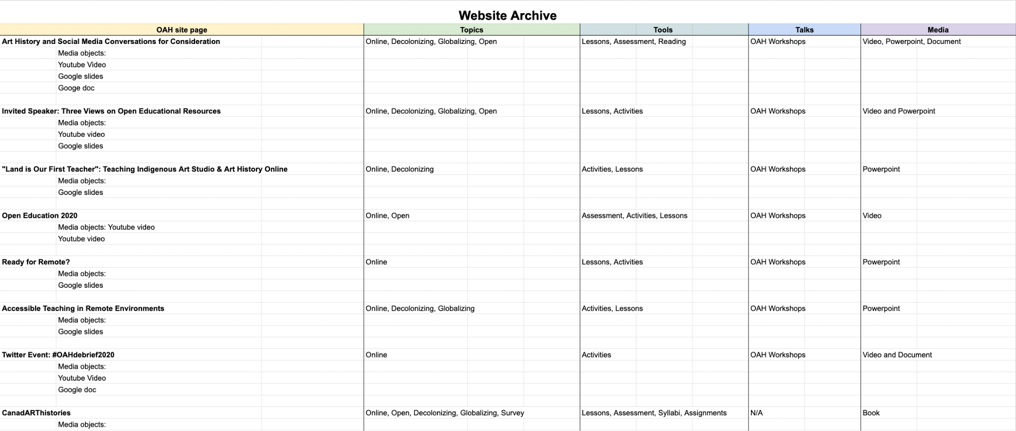In the spring of 2023, a number of students took part in the Canada Constructed internship program, for course credit (FAH481H1) in the Department of Art History at the University of Toronto. Here, third-year student Megan Chen reflects on her internship experience with Open Art Histories…
Tell us about yourself and your internship!

Hello! My name’s Megan, and I’m entering my third year, double-majoring in Art History and Political Science. I enjoy learning about Renaissance and Baroque art and travelling around the world with friends and family!
From May to June of this year, I interned remotely with Open Art Histories (OAH), an organization that helps art history educators develop resources to enrich students’ understanding of art history. Interning with OAH was a great experience because I learned about and contributed to their ongoing projects and met amazing people on the team.
What did you do in your placement?
One of the main tasks was to help OAH revamp their social media posts. I helped them create posts so that in the future, when they want to bring attention to a recorded workshop or resource on the website, they are ready to go. Every week, when I had a meeting with Dr Elizabeth Cavaliere (my internship supervisor) and Kylie Xi (my fellow intern), we would show the posts we made and give each other helpful feedback to make it better.

Another exciting project that we worked on was creating a student success guide. We started this by compiling a list of things we would have liked to know as incoming art history students and then creating a video slideshow with graphics that summarizes what we thought were the most important tips to know. In the near future, this guide will be posted as an Open Educational Resource (OER) available to all students.
OAH also wanted to become more consistent with their newsletters, so they tasked us with creating a newsletter template through Mailchimp while coming up with potential topics to write about. By having a newsletter template, it makes the process more straightforward and efficient.
Lastly, while I was interning, OAH was in the process of moving their site to Humanities Commons, which is an organization that allows people to access OERs and network with those interested in the humanities. To make the process go as smoothly as possible, I was responsible for creating a website archive in Excel that listed all of the resources, recorded workshops and conferences and organizing them into certain categories.

Why do you think other students should consider an internship?
This internship is a great opportunity for art history students because instead of taking a regular class, you will connect with industry professionals and continue to stay in touch with them after the internship has ended. Also, you get a half credit upon completion!
Throughout the internship, all interns in the course working at various organizations met a few times to discuss the exciting projects we’re involved in and what we’ve completed. It’s a fun way to meet other UofT students and appreciate their accomplishments.
“This internship is a great opportunity for art history students because […] you will connect with industry professionals and continue to stay in touch with them after the internship has ended.”
Any words of advice for future internship students?
If you intern with Open Art Histories or any organization, don’t be afraid to ask questions even when the answer might seem obvious. One of the goals I worked on throughout my internship was to ask more questions because not only does it help me, but it can help others as well. My supervisor Elizabeth was happy to answer my questions and explained them clearly and concisely. By asking questions, I demonstrated my engagement with the projects and communication skills and showed that I wanted to know what had to be done rather than guessing.
Lastly, internships are well suited for students with great time management skills. There can be weeks where a lot of work needs to be done, and by completing as many of the tasks as you can, the supervisor will recognize that you are reliable and capable of handling more than one task at a time. It can even lead to the organization asking you to stay on after the course is completed!
Thanks, Megan!
Want to get involved? For more information on current internships visit our Internships page.
You can also contact info@canadaconstructed.ca directly with questions.
This project has been funded in part by the Government of Canada’s Innovative Work-Integrated Learning program and CEWIL Canada’s iHUB.
This project is supported by the Learning & Education Advancement Fund at the University of Toronto.


